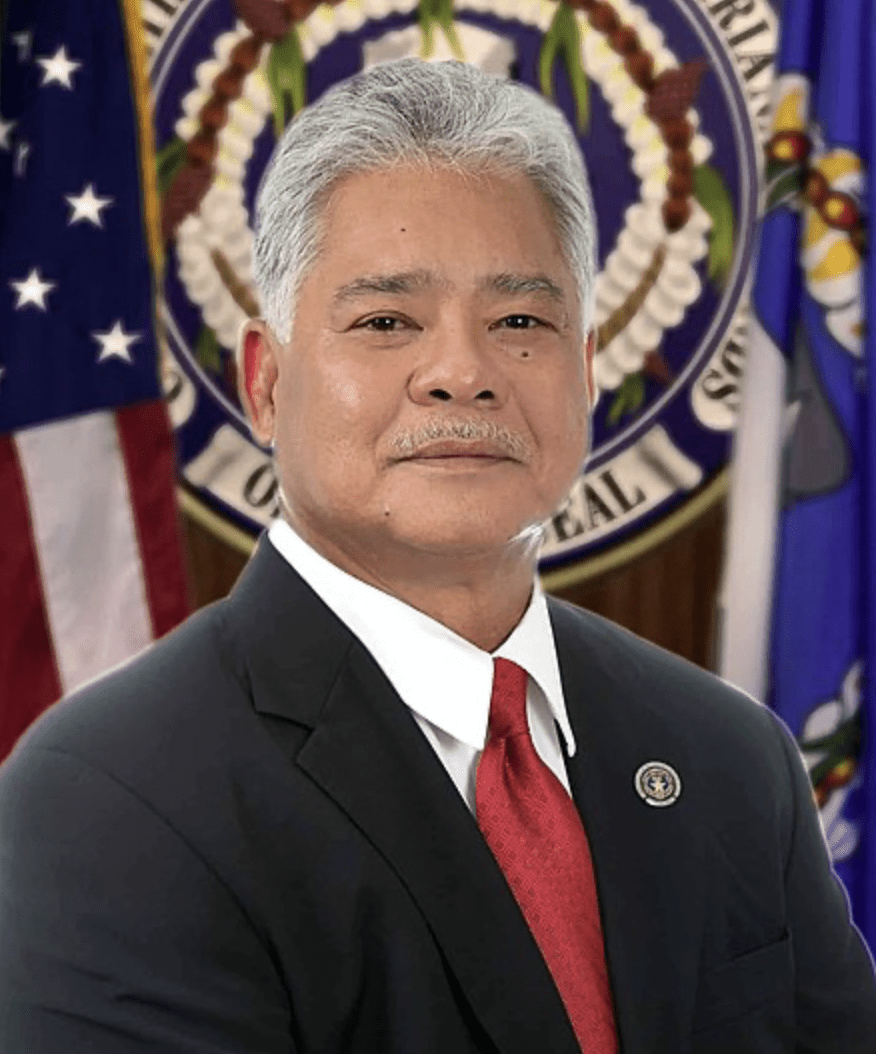 CNMI Gov. Arnold Palacios, in a push to save the Commonwealth government from bankruptcy in the wake of former Gov. Ralph Torres’s destruction, is in Washington, D.C. to repair relations.
CNMI Gov. Arnold Palacios, in a push to save the Commonwealth government from bankruptcy in the wake of former Gov. Ralph Torres’s destruction, is in Washington, D.C. to repair relations.
Asked by federal officials there how they can help the CNMI, a Commonwealth official told Kandit the general quip is, ‘Give us $125 million or more to fund government operations for two years.’
Mr. Torres received four times that amount in discretionary funds, and squandered it all, leaving behind a more-than-$300 million deficit. According to initial assessments by the Palacios-Apatang finance transition team, the Torres administration also left an $83 million deficit in federal pandemic funds.
Mr. Palacios and Guam Gov. Lou Leon Guerrero are in the nation’s capital making their respective push for resources for the Marianas.
Here is testimony Mr. Palacios submitted today before the Senate Energy and Natural Resources Committee:
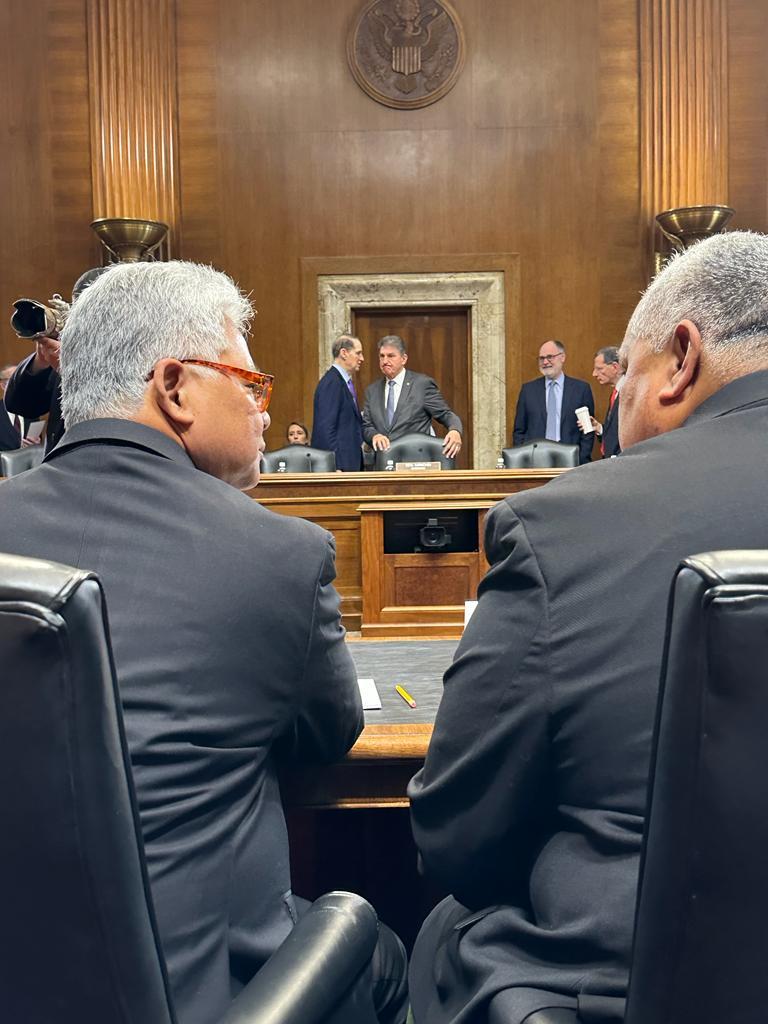 Hafa Adai and Tiroow Chairman Joe Manchin, Ranking Member John Barrasso, and Members of the Senate Committee on Energy and Natural Resources.
Hafa Adai and Tiroow Chairman Joe Manchin, Ranking Member John Barrasso, and Members of the Senate Committee on Energy and Natural Resources.
Thank you for conducting this crucial hearing on the state of America’s territories. As the newly elected Governor of the Commonwealth of the Northern Mariana Islands, I appreciate this opportunity to highlight the strategic importance of our islands to the security of our nation and peace in our Indo-Pacific region. I also wish to share with you the urgent challenges confronting our commonwealth, the path we are forging towards recovery and resilience, and the support we seek from Congress.
We are grappling with crises on multiple fronts: a government in fiscal disarray; an economy still struggling from the impacts of Covid-19 and several unprecedented typhoon disasters that preceded the pandemic; an unstable environment for businesses and workers; dilapidated infrastructure and systems that are woefully underprepared for the climate crisis; and a shrinking population as citizens leave our islands for greener pastures.
Against this backdrop of vulnerabilities are the geopolitical challenges presented by China in our islands and in the region.
My administration is fully committed to rebuilding relationships of trust and confidence among our citizens, our federal partners, and our allies in Micronesia and the wider Indo-Pacific area.
The people of the Northern Marianas are proud American citizens, and critical partners in national security and peace in the region. But we are also vulnerable, struggling to stay afloat in a sea of immense challenges. And I am here to appeal to you, and to all of our federal partners, to support the Commonwealth’s efforts to reach stable ground and ultimately thrive – fiscally, economically, and socially. The interests of the Marianas in getting our government’s financial house in order, shoring up our economy, strengthening our infrastructure, and stabilizing our population are inextricably linked with the interests of our nation and our allies in a secure and peaceful Indo-Pacific.
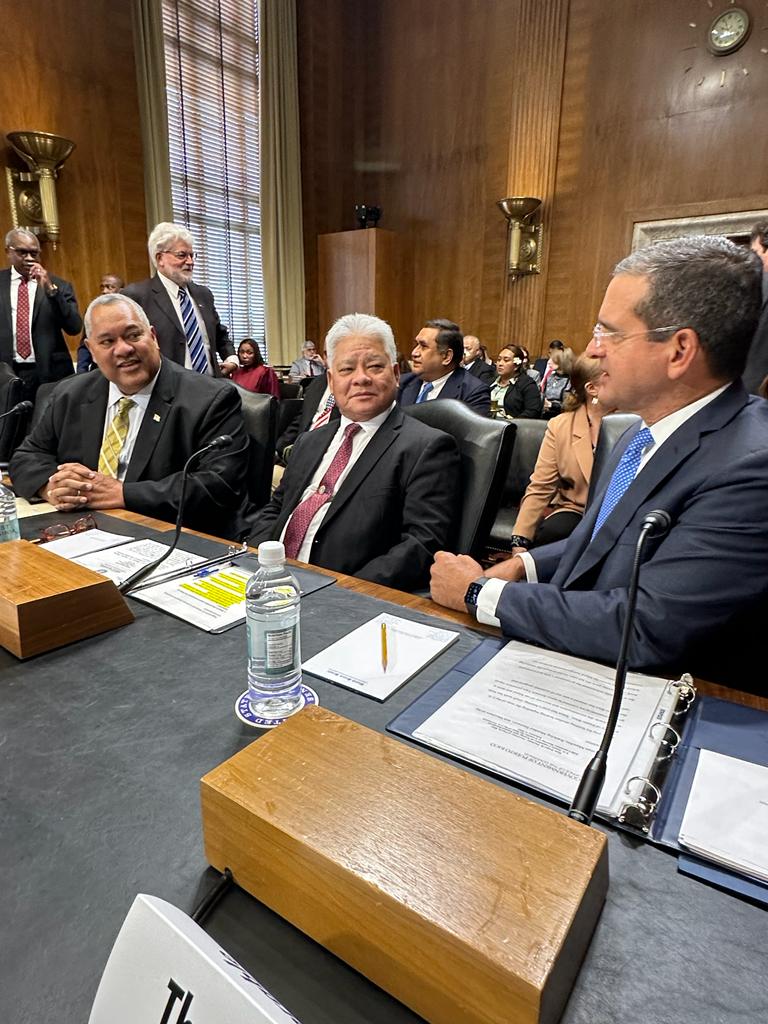 The Commonwealth’s Fiscal Crisis
The Commonwealth’s Fiscal Crisis
Four weeks ago, I was sworn in as the 10th elected governor of the Northern Marianas. I entered an office that had been literally stripped of all furniture and equipment by my predecessor. But far more troubling than that, I found the government’s finances in complete disarray.
Preliminary assessments indicate that the Commonwealth has exhausted and overcommitted the more than $480 million received through the American Rescue Plan Act, with excess obligations totaling an estimated $86 million. The Office of the Governor alone overspent its entire general fund budget for the year by over $1.4 million just in the first quarter of Fiscal Year 2023. In Fiscal Year 2022, according to the Department of Finance, the Commonwealth overspent beyond its appropriated general fund budget by approximately $38 million.
My administration is still assessing the extent of the government’s fiscal woes, but what is clear is that our current predicament cannot only be blamed on external forces – the impacts of the Covid-19 pandemic, for example, or the typhoon disasters before that. Over the past seven years, we have received significant federal resources aimed at helping our community build back stronger from adversity. But we are not stronger today. Instead we are facing fiscal calamity because of years of egregious misappropriation, waste, and abuse of both federal and commonwealth resources with very little oversight and accountability.
Immediately upon taking office, Lieutenant Governor David Apatang and I formed a Fiscal Response Team composed of representatives from the Department of Finance, the Office of Management and Budget, and the Commonwealth Legislature. The team is leading the comprehensive review of the government’s financial records, completing reconciliation of all accounts, and identifying stringent containment measures to cut costs and ensure the continuity of critical government services.
We have already begun to make painful cuts. In the first weeks of my administration, we have issued notices of termination to hundreds of government employees who were funded at unsustainable levels through ARPA funds. We are now preparing to submit to the Legislature a drastically revised budget for the remainder of the fiscal year, and we expect further reductions in the government’s workforce as well as other areas of government operations in the coming weeks.
We have also placed high priority on increasing oversight and accountability for federal and local funds. My administration has sought assistance from, and pledged full cooperation with, the Commonwealth’s Attorney General, the Office of the Public Auditor, and the U.S. Department of Justice in investigating and holding accountable those responsible for the misuse and abuse of public funds. We have also dedicated our limited resources towards finally completing long-delayed single audits of the Commonwealth government for fiscal years 2020 and 2021, and I have sought the assistance of the Public Auditor in reviewing the transition reports that have been prepared for each of the government’s departments and agencies. I have additionally requested federal technical assistance in conducting forensic audits of the Commonwealth’s federal and local accounts.
I met recently with Interior’s Assistant Secretary for International and Insular Affairs Carmen Cantor, and sought her guidance and support in ensuring the Commonwealth’s compliance with federal laws and regulations in the expenditures of federal funds. The Northern Marianas would benefit particularly from a stronger Department of Justice presence, including the assignment of more federal agents based in the Commonwealth, and the appointment of a dedicated District U.S. Attorney. We seek federal assistance as well in building a robust financial management system that is tailored to the Commonwealth’s needs, and in bolstering local capacity to monitor the government’s finances, conduct audits, and enforce collections. My aim is to ensure that the systems are in place to deter and detect the kinds of abuses of public funds that were rampant in our recent past, and improve stewardship and accountability for these funds to secure our future.
Additionally, my administration is revisiting recommendations put forth during the Fiscal Response Summit held in the Marianas in May 2020. The summit was funded and facilitated by Interior, and brought together a wide range of community members from across the public and private sectors to identify creative and practical solutions to the Commonwealth’s fiscal troubles. These included various proposed measures to improve government efficiency, reduce costs, and raise revenue. Many of these recommendations were never actually implemented or seriously explored by my predecessor, but I believe they remain relevant and worthy of consideration today.
The Fiscal Response Summit is a good example of the kind of fruitful partnership I would like to build upon, between the Commonwealth and the federal government. The summit showed that with the support of our federal partners, and backed by our community and political leadership, we can indeed generate locally driven and achievable solutions to seemingly intractable problems.
As my administration continues to tackle our government’s fiscal disaster head-on, I want to remind this body that the Commonwealth is still recovering from disasters that in themselves were also unprecedented and extraordinary in scale.
Just a few years ago, the Commonwealth was devastated by three major typhoon disasters that occurred within the span of only three years: Typhoon Soudelor ravaged Saipan with record-breaking winds and rain in August 2015; Typhoon Mangkhut slammed into Rota in September 2018; and in October 2018, Super Typhoon Yutu flattened Tinian and much of Saipan. Yutu was a Category-5 storm that ranked as the most powerful on earth that year and was the worst storm to hit the United States since 1935. These storms wrecked homes, businesses, schools, and infrastructure, and brought into sharp focus the vulnerabilities of our islands to the impacts of the climate crisis. We have yet to fully recover.
These natural disasters were followed by an economic downturn as tourism, our primary industry, slumped. Tourist arrivals dwindled, local businesses shut down, government revenue dropped precipitously, and austerity measures were implemented throughout all levels of government.
Thankfully, we have not been alone in our struggles to rebuild and recover from back-to-back disasters. We are grateful to the Federal Emergency Management Agency and all our federal partners for the aid delivered to the Commonwealth in our time of need. Even to this day, we are working with FEMA and our partners to continue on this long term path of recovery, rebuilding and hardening critical infrastructure throughout the Marianas, including our airports, schools, and healthcare facilities.
It was barely a year and a half after Super Typhoon Yutu when the Covid-19 pandemic reached the shores of the Marianas, disrupting every aspect of life in the islands as it did throughout the world. Supply chains were disrupted, workers were displaced, many businesses closed permanently, schools and government offices shut down, and our healthcare system was strained. Moreover, our tourism industry came to a complete halt as our primary markets in Asia closed their borders and international airlines canceled flights.
Our hospitality industry has long been the Commonwealth’s economic lifeline. It has allowed us to build a sustainable workforce and thriving small businesses, practice responsible stewardship of the natural resources and tropical beauty of our islands, and generate revenue to support public services. Under the far-reaching impacts of Covid-19, that industry was collapsing before our eyes, even as we had barely begun to recover from the typhoons that came before. As evidence of this, according to the Bureau of Economic Analysis, the Commonwealth’s real gross domestic product (GDP) decreased 29.7 percent in 2020 after decreasing 11.3 percent in 2019.
Thankfully, congressionally approved financial aid packages like the CARES Act and ARPA provided the Northern Mariana Islands much needed funding to respond to the pandemic and mitigate its devastating effects. But as we have come to learn, unfortunately and embarrassingly, much of these funds were squandered by the previous Commonwealth administration. These funds were supposed to go to critical infrastructure and essential public services, support business retention and jobs, stave off a fiscal cliff, and keep us afloat for at least three years until 2024. Now, in 2023, we are free falling from a fiscal cliff that came two years too soon—in our already crippled island economy. Inflation has only worsened our situation.
We fully understand that the blueprint to economic recovery is not without hardship and sacrifice. The people of the Marianas have faced daunting adversity before, and we pull together as a community to address our challenges. As members of the American family, we look to our federal partners as well, for support in placing the Commonwealth on a sustainable path to recover, rebuild, and thrive.
The Commonwealth has received significant resources to rebuild and repair damage following the typhoon disasters, and many of these projects are still in various stages of implementation. Through the Community Development Block Grant – Disaster Recovery program alone, for example, the Commonwealth received $248 million to fund critical housing and infrastructure projects throughout Saipan, Rota, and Tinian. Federal funds from other programs have also been allocated to various projects that include:
- ● $81 million for the Commonwealth Utilities Corporation, $8.9 million for the Commonwealth Ports Authority, and $53.3 million for the rebuilding of the educational facilities within the Public School System, from the FEMA Public Assistance Program; and
- ● $21.9 million for the design and construction of a modern cultural facility and sports complex, $19.6 million for the design and construction of an Economic Resiliency Center, $11.2 million for the revitalization of Saipan’s main tourist district in Garapan, and $23.5 million for the Northern Marianas College and the Northern Marianas Trades Institute, from the Economic Development Administration.
 We are grateful for the federal investments that have been made in projects such as these which will go to support the long-term economic recovery of the Marianas. But what we have found is that in the years that have lapsed since the disasters occurred, these projects have encountered significant hurdles in execution, ranging from limited local capacity and labor shortages, to cumbersome federal environmental review process, rigid deadlines, and inflexible grants that do not take into account costs that have skyrocketed from the time that projects were approved for funding. For example, long before the pandemic and soaring inflation, when the Northern Marianas College, our sole institution of higher education in the Commonwealth, applied for and secured EDA and other grants to rebuild its campus that had been destroyed by Super Typhoon Yutu, the estimated cost of construction on the high end was approximately $375 per square foot. Today, that cost per square foot has jumped at least 40%, and the college must now scale back its project plans significantly to stay within its means.I would welcome the opportunity to have a conversation with our federal partners about how we can break the bottlenecks holding up hundreds of millions of federal dollars awarded to support the Commonwealth’s economic recovery and development, and provide greater flexibility and consideration of the contingencies that so dramatically impact our ability to complete these critical projects. Moreover, I believe with the climate crisis bearing down heavily upon us and more frequent and severe weather events anticipated in the future, we need the federal government to seriously consider establishing a permanent FEMA presence in the Marianas.
We are grateful for the federal investments that have been made in projects such as these which will go to support the long-term economic recovery of the Marianas. But what we have found is that in the years that have lapsed since the disasters occurred, these projects have encountered significant hurdles in execution, ranging from limited local capacity and labor shortages, to cumbersome federal environmental review process, rigid deadlines, and inflexible grants that do not take into account costs that have skyrocketed from the time that projects were approved for funding. For example, long before the pandemic and soaring inflation, when the Northern Marianas College, our sole institution of higher education in the Commonwealth, applied for and secured EDA and other grants to rebuild its campus that had been destroyed by Super Typhoon Yutu, the estimated cost of construction on the high end was approximately $375 per square foot. Today, that cost per square foot has jumped at least 40%, and the college must now scale back its project plans significantly to stay within its means.I would welcome the opportunity to have a conversation with our federal partners about how we can break the bottlenecks holding up hundreds of millions of federal dollars awarded to support the Commonwealth’s economic recovery and development, and provide greater flexibility and consideration of the contingencies that so dramatically impact our ability to complete these critical projects. Moreover, I believe with the climate crisis bearing down heavily upon us and more frequent and severe weather events anticipated in the future, we need the federal government to seriously consider establishing a permanent FEMA presence in the Marianas.
A Population in Decline, Facing an Uncertain Future
The 2020 Census showed shrinking populations across America’s territories, including the Northern Marianas. Our population dropped from approximately 54,000 in 2010 to just 48,000 in 2020, a function of outmigration and a flagging economy. Our ability to recover economically is made even more challenging with a declining population. A major part of our struggle to carry out critical infrastructure and development projects is a shortage of labor and serious uncertainties affecting the stability of the Commonwealth’s workforce.
I therefore strongly support our U.S. Congressman Gregorio Kilili Sablan’s recently re-introduced legislation, HR 560, the Northern Mariana Islands Population Stabilization Act, which would encourage approximately 1,600 long-term foreign workers living in our islands since 2015 to remain in the Marianas by offering them a Commonwealth-only permanent status.
Population stability in the Marianas is also a matter of national concern. As Congressman Sablan has stated, “The population loss in our islands and resulting loss of economic viability not only hurts all of us, but also has implications for the U.S. strategic position in the Western Pacific. With increasing competition for dominance from China, the United States needs to be strengthening our position in the region, not shrinking in significance. That legislation [HR 560] fits into that larger strategic imperative.”
I see opportunities to further stabilize our population by shoring up our energy security and bringing down the cost of power for the suffering citizens of the Marianas. The astronomical cost of power in the islands is the single biggest expense for most households and businesses. It has literally driven residents to move out of the islands and forced businesses to close. Our power infrastructure is aging and dilapidated, we depend almost entirely on imported fossil fuel that costs the Commonwealth upwards of $50 million a year, and we lag behind the rest of the nation in shifting to clean and renewable sources of energy. We are, however, finally poised to adopt updates to the Commonwealth’s strategic energy action plan, which will provide a roadmap to cost-effective energy management solutions, including our transition to renewable energy. My administration is committed to supporting the implementation of this plan, and we will seek further support from federal partners to invest in the Commonwealth’s energy security as a means of bringing stability and relief to the people of the Marianas.
 Also key to population stabilization are stronger social safety nets and parity in the federal programs that apply to the Marianas. We are grateful for the generous funding increases that Congress has approved for Medicaid and Nutrition Assistance over the years, but true parity remains just out of reach as long as funding is fixed in statute and not tied to need as it is throughout the states. In times of crisis, when people need help the most, is when federal funding for critical safety nets can run out, and it is in fact under these circumstances that the Marianas has actually had to slash Medicaid and food assistance benefits for its most vulnerable citizens until supplemental funding was made available by Congress. In this current time of crisis, the Commonwealth is projecting to run out of Medicaid funds by June this year. Our Medicaid Agency is already contemplating the suspension of services even as it braces for a deluge of new applications once the national public health emergency ends and as more people are displaced from their jobs.
Also key to population stabilization are stronger social safety nets and parity in the federal programs that apply to the Marianas. We are grateful for the generous funding increases that Congress has approved for Medicaid and Nutrition Assistance over the years, but true parity remains just out of reach as long as funding is fixed in statute and not tied to need as it is throughout the states. In times of crisis, when people need help the most, is when federal funding for critical safety nets can run out, and it is in fact under these circumstances that the Marianas has actually had to slash Medicaid and food assistance benefits for its most vulnerable citizens until supplemental funding was made available by Congress. In this current time of crisis, the Commonwealth is projecting to run out of Medicaid funds by June this year. Our Medicaid Agency is already contemplating the suspension of services even as it braces for a deluge of new applications once the national public health emergency ends and as more people are displaced from their jobs.My administration is also supporting the development of a community-based coalition of social service agencies, educational and health institutions, and other organizations to alleviate the impacts of the fiscal and economic crisis on individuals and families. The coalition will seek to facilitate efficient processing of applications for food assistance and Medicaid, develop options to provide access to affordable housing and health insurance, and recommend or pursue options for unemployment assistance or other short-term financial aid, and connect individuals who have lost income or employment with opportunities for new jobs or training. My administration is further working with the Commonwealth Legislature, employers, and educational systems to establish a robust apprenticeship program in the Marianas and strengthen our workforce capacity as we prepare for the end of the Commonwealth-Only Transitional Worker program in 2029. The Commonwealth has received federal grants to establish the infrastructure for the apprenticeship program and support implementation, but we will need to identify additional resources to fund incentive programs and cover at least part of the wages of apprentices, the need for which is tremendous in the CNMI.
The Commonwealth benefited greatly from the Pandemic Unemployment Assistance program, but we also had to learn some hard lessons about how to effectively administer such a program where there was previously no system for unemployment assistance at all. Although PUA has closed, the Commonwealth’s Department of Labor continues to process the pending claims of more than 1,000 people, and has received an extension to complete this work in 2024. We must also begin the groundwork for an unemployment insurance program in the Commonwealth, and we will seek the assistance of our federal partners to build our capacity and establish this critical safety net.
A final note on stabilizing the Marianas population: I appeal to you to consider amending the U.S. Workforce Act of 2018, which governs the administration of the CW program. The program’s end is just around the corner in 2029, and we recognize the diminishing number of CW permits every year. Given the context of an overall shrinking population, the needs of the Marianas and the region for stability, and the re-introduction of Congressman Sablan’s HR 560, I ask for your support in repealing the touchback provision that requires CW workers to exit the Commonwealth for at least 30 days prior to the submission of their third renewal petition.
Repealing the touchback provision would not be so urgent if the permit processing from both U.S. Labor and U.S. Citizenship and Immigration Service were more timely and efficient. Currently, processing times for CW-1 permits are so delayed that employers wait months after the petition start date to receive the necessary approvals to secure entry of the CW-1 permit holder to the CNMI. As a result, a large proportion of workers will be required to depart all at the same time without a clear timeline for their return, and at a time when businesses are attempting to regain normalcy in operations. The touchback provision’s disruptions to families, businesses, and the overall economy cannot be overstated. For businesses reliant upon a set number of employees, the touchback requirement necessitates the onboarding and training of additional staff to ensure that operations continue. These additional costs create a significant burden on small businesses attempting to recover from the pandemic.
I hope for an open and candid conversation with our federal partners about this and other areas of the Workforce Act and the CW program that can be improved or modified in light of the new realities and monumental challenges we face in the Commonwealth.
 Strengthening Our Ties, Securing Peace in Our Region
Strengthening Our Ties, Securing Peace in Our RegionMore than fifty years ago, the Commonwealth’s founding fathers traveled thousands of miles across the sea to Washington, DC to negotiate what would become the Covenant between the Northern Marianas and the United States. The Marianas delegation was led by Edward Pangelinan, Chair of the Marianas Political Status Commission who would later become the Commonwealth’s first Resident Representative in Washington. Mr. Pangelinan passed away just a few days ago, and I ask that we keep his family in our prayers as we remember and honor his legacy. The Marianas delegation also included my own father, the late Dr. Francisco Palacios.
The Commonwealth’s founders envisioned a strong and vibrant Marianas in close political union with the United States. They dreamed of a flourishing democracy and a decent, American standard of living for the people of the Marianas, who were struggling then to rebuild our islands from the ashes of war and colonization.
That hopeful vision of a thriving Marianas and a strong relationship with the United States holds true today. And like the Commonwealth’s founding fathers, I have traveled 8,000 miles to this great city, guided by a firm commitment to this vision, and the promise of self-government under the stars and stripes. I carry with me the decisive mandate of the people to repair and strengthen relationships of trust with our federal partners and our allies in the region, as we strive once again to rebuild our islands from extraordinary adversity and reaffirm our commitment to a secure, free and peaceful Indo-Pacific.
We are acutely aware of the sensitive geopolitical challenges of our region. And we recognize the vital role that the Northern Marianas plays in ensuring the safety and security of all Americans, and supporting the strategic position of the United States in the Indo-Pacific.
To underscore our commitment, I have been engaged in collaborative discussions with senior ranking military personnel, including Assistant Secretary of the Navy Meredith Berger, and Commandant of the U.S. Marine Corps General David H. Berger, who recently traveled to Saipan to discuss expanding cooperation and communications between the Commonwealth and the U.S. Department of Defense. Last week, I also met with U.S. Air Force officials to discuss the progress of the divert airfield project on Tinian, which is intended to provide a critical alternative operating location to the U.S. Air Force’s Andersen Air Force Base on the island of Guam. Andersen’s Commander, Brigadier General Jeremy Sloane, has described the Tinian divert development project as the “largest and most important Air Force project in the region.”
I have pledged the full support and cooperation of my administration in seeing the divert airfield project through, and I look forward to continuing engagement with the Department of Defense in discussions of other proposed future training facilities and activities in the Marianas.
Our Shared Future
Securing the fiscal, economic, and social stability of the Marianas is directly tied to the security of our nation and America’s position in our part of the world. We face many challenges in the Commonwealth, but they are not insurmountable, and our people possess the grit, resilience, and resourcefulness to pull together as we always have in times of crisis to solve our problems. That said, we do need help. I am not here to ask for bailouts or handouts, but I am asking for open dialogue and meaningful partnership with our federal government. We need technical assistance to help us build our own capacity to ensure fiscal discipline, compliance, and accountability and get our financial house in order. We need fixes in federal policy to help us move hundreds of millions of federal dollars in stalled projects. We need congressional support to help stabilize our economy and population, and to strengthen crucial social safety nets.
We in the Marianas are Americans too. We are grateful for the rights and privileges that come with being part of the American political family, and we are proud to contribute as much as we do to the peace, freedom, and promise of our nation. Our political union enshrined in our Covenant lays a solid foundation for a sustainable and prosperous future, but it can always be made more perfect. I am confident that with the support of Congress and all our federal partners, we will together be able to build a better, brighter, and more stable and resilient future for the Marianas, for the region, and for our nation.
Thank you again for this opportunity to testify before you today. May God bless the Northern Mariana Islands, and our United States of America.


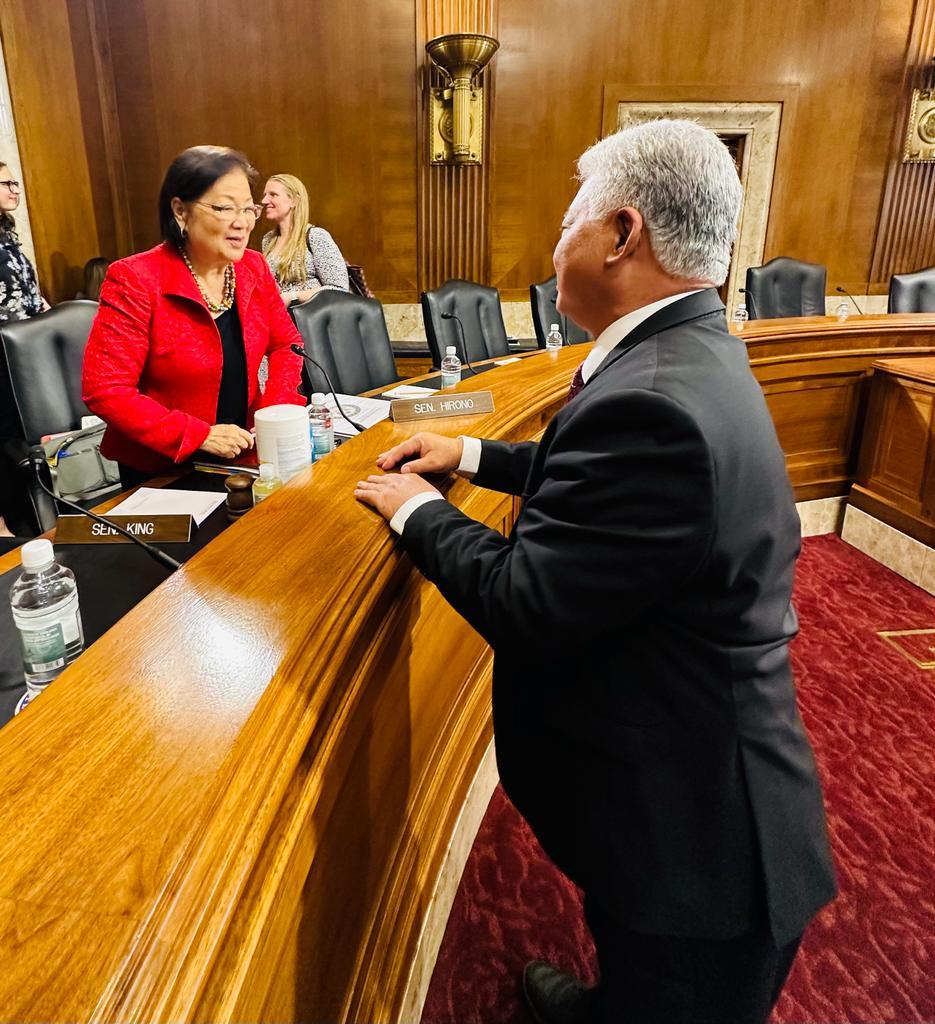
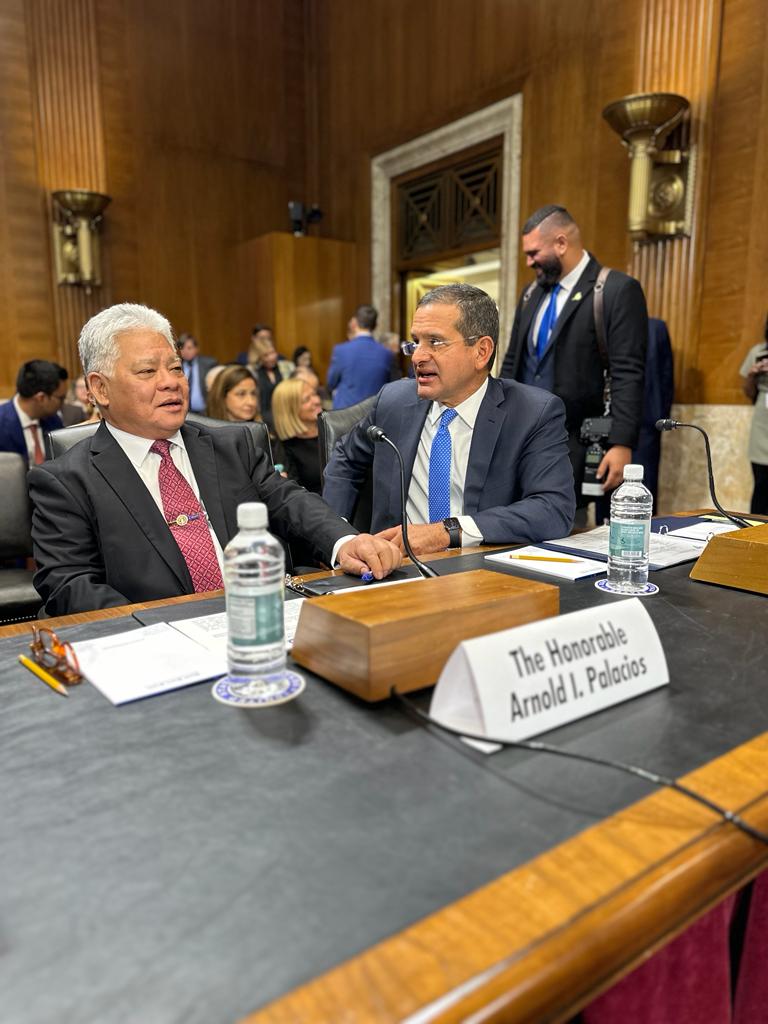
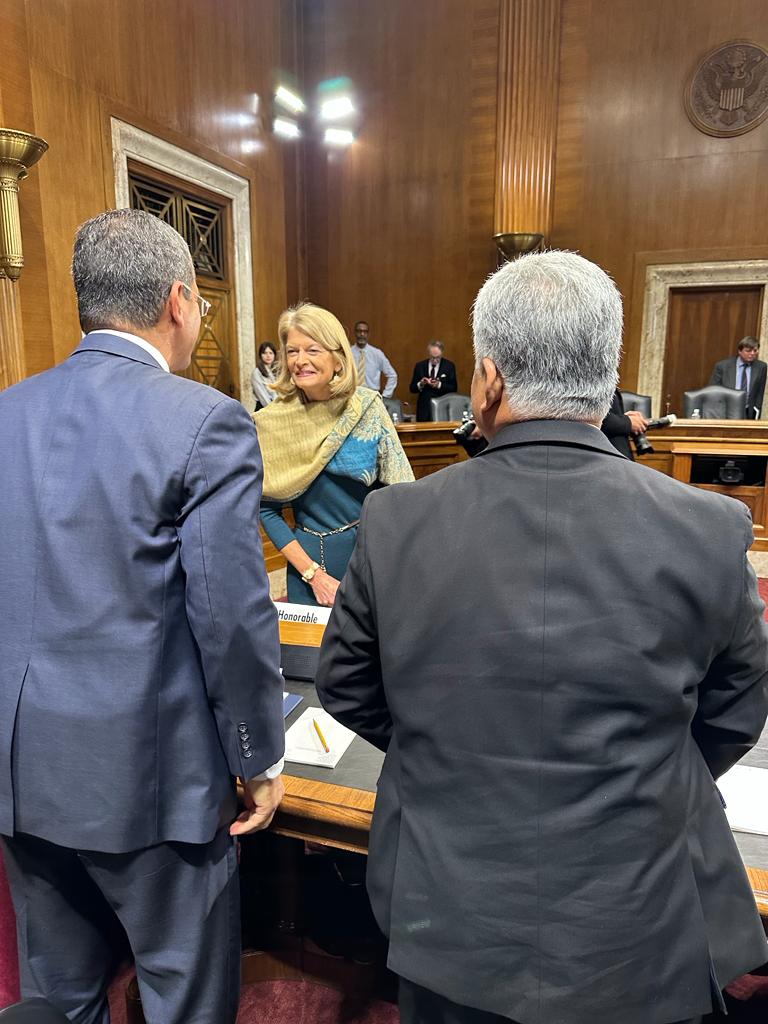
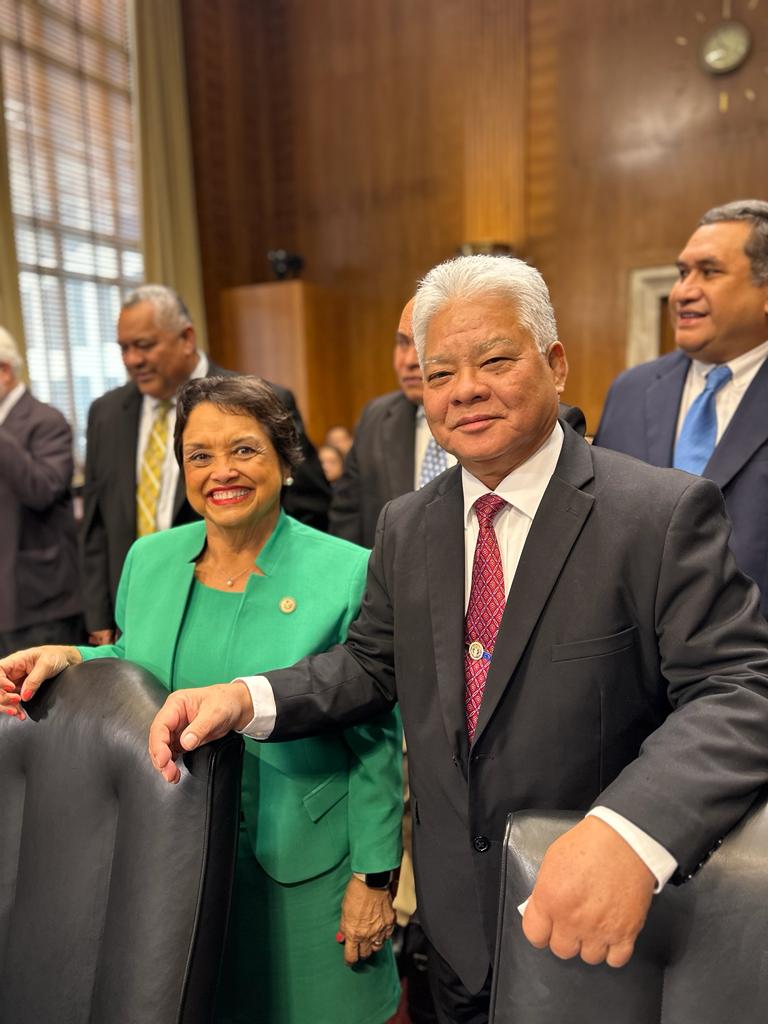


1 Comments
Russ Mason
02/10/2023 at 6:04 PM
Fine speech Governor. I sure hope it bears fruit!
Here’s a question I have no answer to: can former Gov. Torres be held criminally liable for squandering the People’s money? Sure seems crooked to me, including removing the furniture. When he lost the election on 11/25 he became a vengeful spoiled brat, and did as much harm as he possibly could to the People and our government. I am not a vengeful person, but Ralph the Rat needs to be punished and spanked, hard.